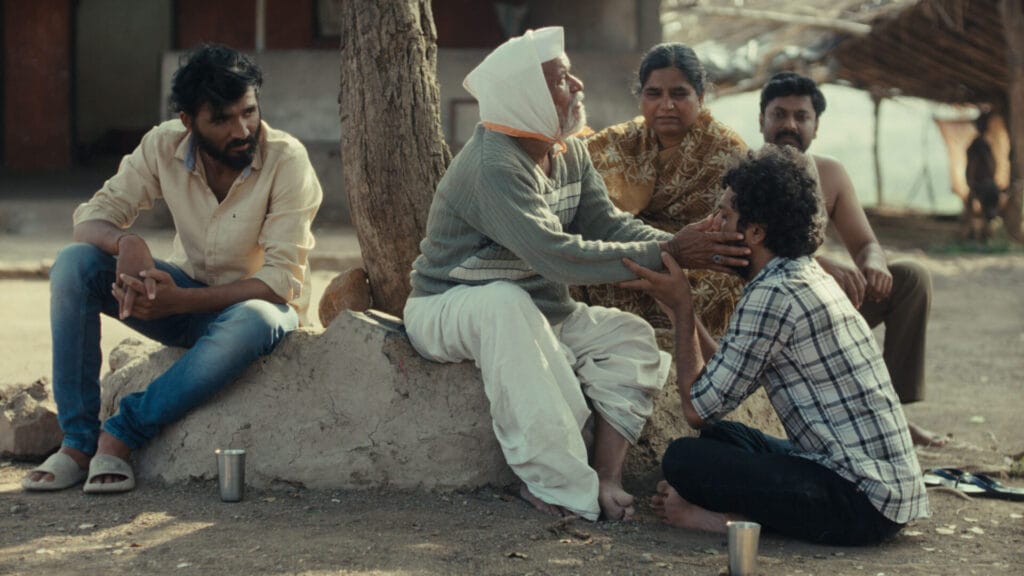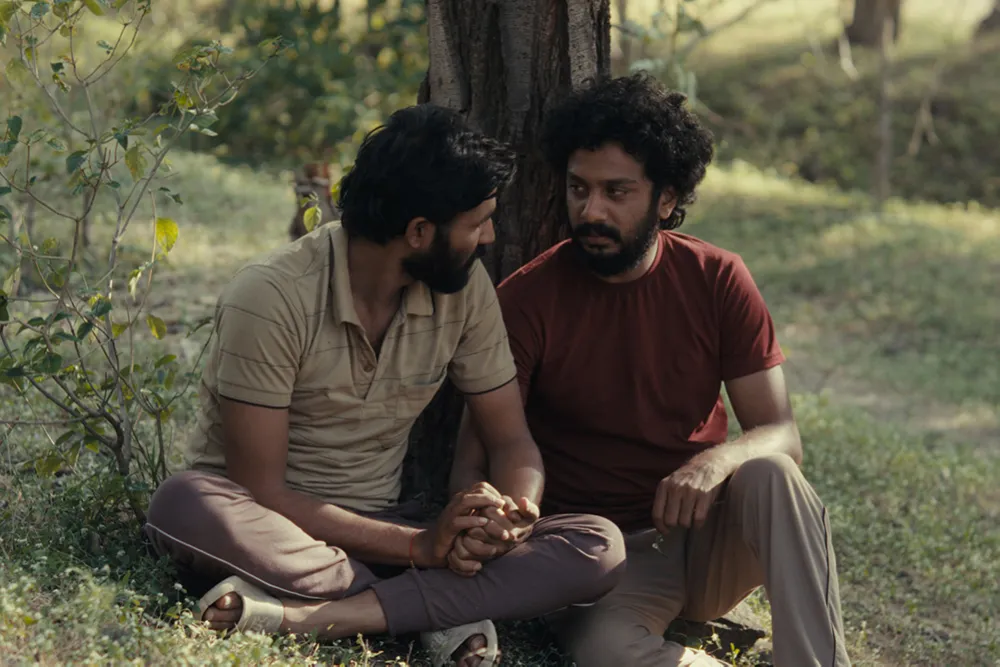By Ahmad Maksoud, Communities of Color & Media Consultant
As a brown, queer, first-generation cis man in the US, I rarely find stories that resonate with my intersectional lived experience. Typically, I can rely only on witnessing one facet of my identity represented to any degree of accuracy, let alone with real style and substance. It was to my delight and surprise, then, to find such parallels with my own life in Rohan Parashuram Kanawade’s film Sabar Bonda (Cactus Pears), which premiered this winter at Sundance. I imagine many viewers, regardless of their ancestral origins, will find catharsis in witnessing Kanawade’s elegant exploration of the tension between upholding tradition and honoring personal queer identity.
Sabar Bonda follows Anand (Bhushaan Manoj), a 30-something resident of Mumbai who returns to his family’s country home after his father’s death. During his stay, he must participate in traditional mourning rites, despite the objections of several family members who find his marital status (as a single man) disrespectful to his responsibilities; this judgment serves predictably as a weak mask over their general disdain for his homosexuality. As the week proceeds, Anand bonds with another farmer in his hometown, Balya (Suraaj Suman), who similarly seeks to stay unmarried as a gay man himself, is similarly met with suspicion by his family members, and is similarly isolated because of it. Sabar Bonda follows this blooming relationship within the evolution of Anand’s family obligations and the decisions he faces once his duties are complete.

Kanawade captures these conflicts without villainization or insult. Anand so deeply wishes to shepherd his father’s spirit in the ways he is called to without betraying the integrity of his identity; his mother Suman (Jayshri Jagtap), who does her best to support and connect with her son must still uphold cultural expectation and duty to family as she understands those things, despite however maintaining this balance has distanced her from her child. One scene, where Anand lays his head on her lap and they connect for what seems to be the first time after a long while expertly captures similar conversations I have had with my own mother. Anand’s extended family members, however much they question his place within these rites, still fundamentally do so out of respect for their traditions and the recently deceased, and despite their ignorance are still portrayed with respect and dimension. The subtlety and nuance of these dynamics is elegantly presented by the exceptional acting done by the cast across the board. I am of Egyptian, and not Indian descent; and yet, this push and pull, between venerating centuries-old traditions and maintaining personal dignity, between mourning and honoring the passing of one’s father and enduring the pressures of other family members who only wish to do the same is one I know all too well, and one I felt so vulnerably grateful to witness.
I found the budding relationship between Anand and Balya to be most impactful, as they explore a deep longing for the intimacy and physical affection so starkly absent in their own independent lives. Sabar Bonda doesn’t bother with sensationalizing their romance for the sake of drama, allowing it instead to develop steadily and delicately, as Anand and Balya’s need for each other rises in response to increased familial pressure. Kanawade similarly captures this steadiness and delicacy in the utter absence of music, and in the duration and pacing of his scene work. He has scored the film entirely with the soundscape of a small, rural Indian farming village; he lets frames linger stoically, generously patient with his actors’ developing emotional states. Nothing seems rushed but never overstays; it all simply moves as it’s supposed to, each moment ringing with potency and a palpable sensory experience for the viewer.
I could say so much more about Sabar Bonda – about how the film gives us insight into how queerness exists in India’s lower castes, its quiet moments of humor, the beauty and history of the cultural rites it captures – but I’ll let the film’s creators speak for it themselves. Check out my interview below with Kanawade and producer Neeraj Churi. I sincerely hope you all have an opportunity to watch Sabar Bonda while I root for its larger, wider distribution.
And now, join us for a sit down interview with Rohan Kanawade (Director, Sabar Bonda – Cactus Pear) and Neeraj Churi (Producer, Sabar Bonda – Cactus Pears) as we explore the real life stories that inspired this incredible film.
In honor of Mental Health Awareness Month (May) Ahmad Maksoud, Rohan Kanawade (Director) and Neeraj Churi (Producer) reflected on how they prioritize mental health in an industry known for its intensity and unpredictability. We also explored how their stories resonate with broader community experiences, and those living with HIV/AIDS.
Rohan Kanawde: You know, I can tell you this, I did go through a dark time (mentally) and thankfully I had friends and my partner that I could speak with and they really supported me during that time. And writing! I have to also put some effort and get out of the situation otherwise it will not happen.
That’s when I made a decision to write something that makes me feel happy. And that’s also why this script (Sabar Bonda – Cactus Pears) happened. As an independent artist sometimes you go through dispatches because there isn’t support all the time and you doubt yourself as an artist. That’s why having those people around and talking to them actually helps. Giving yourself time to heal.
Neeraj Churi: I’ve been involved in production of queer films (and worked with people living with HIV) in India and that itself is a really lonely process because not many people are comfortable producing films or associating with these films. Perhaps forming a support group of producers or filmmakers who want to tell their stories would be exciting. Having a partnership with your producer (as a human) and you as the artist (a person) create a nurturing space. Find the right people from the community to partner with. It will make you feel heard and seen.
Ahmad Maksoud: Considering the creative process can be such a roller coaster, it also doesn’t happen in a vacuum. We create stories because of our own lived experiences. We forget or neglect to actually live our lives and to still pursue experiences of pleasure that inform the kind of stories that we want to tell.
For me, a lot of the pursuit of mental health within the creative process is to not forget to to continue to live my life and do so with the people that I love.













